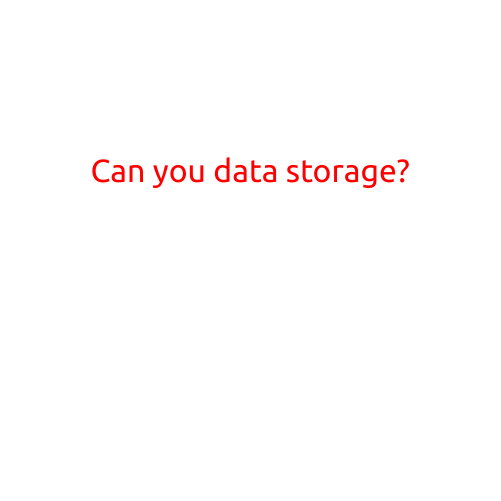
Can You Store Data?
In today’s digital age, data storage has become an essential aspect of our daily lives. With the increasing reliance on digital devices and online services, the need to store and manage data efficiently has never been more crucial. But can you really store data? Let’s dive into the world of data storage and explore the possibilities and challenges that come with it.
What is Data Storage?
Data storage refers to the process of storing and managing digital data, including files, documents, images, videos, and other forms of digital content. Data storage solutions can range from simple external hard drives to complex cloud-based systems, each with its own set of features, limitations, and costs.
Types of Data Storage
There are several types of data storage solutions available, each designed to meet specific needs and requirements:
- External Hard Drives: External hard drives are physical devices that connect to your computer via USB or other interfaces. They offer a secure and portable way to store data, with capacities ranging from a few hundred gigabytes to several terabytes.
- Cloud Storage: Cloud storage services, such as Dropbox, Google Drive, and Amazon S3, allow you to store data online, accessible from anywhere, and scalable to meet your growing needs.
- Memory Cards: Memory cards, such as SD cards and microSD cards, are designed for storing data on mobile devices, cameras, and other portable devices.
- Solid-State Drives (SSDs): SSDs are faster and more reliable alternatives to traditional hard disk drives (HDDs), offering higher performance and lower latency.
- Network-Attached Storage (NAS): NAS devices are dedicated storage solutions that connect to your network, allowing multiple devices to access and share data.
Challenges in Data Storage
While data storage solutions have become more accessible and affordable, there are still several challenges to consider:
- Security Risks: Data storage solutions are vulnerable to hacking, malware, and physical theft, posing a significant threat to data integrity and confidentiality.
- Data Loss: Data can be lost due to hardware failure, software issues, or accidental deletion, leading to significant financial losses and reputational damage.
- Scalability: As data grows, storage solutions must be able to scale to meet the increasing demands, without compromising performance and reliability.
- Accessibility: Data storage solutions must provide convenient and secure access to data, regardless of location or device.
Best Practices for Data Storage
To ensure the integrity and accessibility of your data, follow these best practices:
- Use Strong Passwords and Encryption: Use strong passwords and encryption to protect data from unauthorized access.
- Back Up Data Regularly: Regular backups can save your data in case of unexpected events, such as hardware failure or data corruption.
- Choose the Right Storage Solution: Select a storage solution that meets your specific needs, considering factors such as scalability, security, and accessibility.
- Monitor and Maintain Storage Systems: Regularly monitor and maintain your storage systems to ensure optimal performance and compliance with regulatory requirements.
In conclusion, data storage is a critical aspect of our digital lives, and it’s essential to choose the right storage solution for your needs. By understanding the types of data storage solutions available, the challenges posed by data storage, and the best practices for data storage, you can ensure the integrity and accessibility of your data, and make informed decisions about your digital storage needs.





